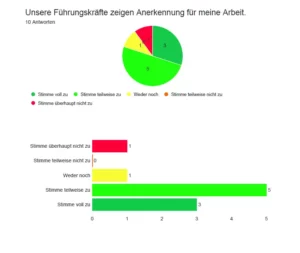Team surveys companies and manage a team of employees
Team surveys in companies are important. The reason: not only do you manage a business, you also manage a team of employees. As the boss, you might primarily be interested in sales figures, customer service and revenues. Over time, you may forget the most important factor in your company: your employees and the dynamics within that particular and vital group.
Maybe you’re one of the bosses who keeps an eye on these group dynamics. Maybe you know how each and every one ticks. So far, so good. But let me ask you this question: what is REALLY going on among your employees? How do they see each other, how do they see their colleagues? Are they happy, do they have worries, is there bullying, burn-out, mental strain?
It is vitally important for both you and your business to find out if the above-mentioned issues are part of your team’s daily work life. However, finding out all this on your own costs you time. Time, which you will have to invest elsewhere, namely the day-to-day business. How about an anonymous employee survey that uncovers all your team’s issues with the business, each other, and you?
Team surveys in companies – what needs to be considered?
In order to make an employee survey successful, only a few key points need to be taken into account. This applies to both the conception and the implementation of the survey and the compilation of the questionnaire – especially, if it is conducted online. This way, you can improve the participation rate, thus ensuring results that are of a higher quality and value for your company.
Note: anonymity and data protection must be your top priority in an employee survey! Your employees must be absolutely certain that the answers given by them can’t be looked into either by you, or a third party! The same goes for their data – no one must find out anything about them, including their IP address! Otherwise, neither the answers, nor the results, will be honest and authentic!
Also note: to a certain extent, an employee survey is a voluntary matter. This means that the results of said survey should – under no circumstances – be penalized! Instead, understand the survey as a tool for improvement that is both necessary and long overdue. See it as your chance to eliminate serious issues and the chance to optimise your company and the way your employees see it.
Employee survey – how does the employee see himself?
Naturally, the main focus of an employee survey is on the employee himself. Using such a questionnaire, you have the opportunity to find out what he really thinks about the business, his colleagues, the customers – and you. In order to find this out, the survey is made up of a catalogue of questions, which ideally are arranged in random order.
How does the employee see himself? In this category, the following questions can be answered:
- He/she has the scope he/she needs for the daily work in the company
- The job allows him/her to combine work and private/family life well
- He/she feels adequately challenged and supported
- He/she is satisfied with the company
The answers are given on the following scale: “fully agree” to “don’t agree at all”. This gives you a first indication of whether your employees feel comfortable and happy in your company. You also see if they are passionate about their jobs or if their jobs are merely a means to an end. In turn, you’ll have the chance to adjust any weak points the results have thrown up.
Anonymous employee survey – how does the employee see his colleagues?
Fact: There’s not always sunshine in any team. Resentment, envy and the struggle for the boss’ recognition and appreciation regularly lead to discord, and, if worst comes to worst, to bullying and other disturbances in the work place. Therefore, one of the main directives of an employee survey is to find out what the different relationships within your team are like.
Some of the questions that employees have to answer in regards to their colleagues are the following:
-
He/she believes that the employees have each other’s back
-
For him/her, it is important to have regular meetings with the colleagues
-
He/she feels that their work is appreciated & recognised by their colleagues
-
He/she believes that the cooperation between the team members works well
In this category, you can also determine whether your employees feel they have enemies within the team. This may sound dramatic and might cause a lot of trouble – especially in an emergency situation, since hostilities between team members can quickly get out of hand. Conflicts also impair the cooperation of the other team members and contribute to “emotional battle lines” in your company.
Top ratio?! The employee’s relationship to his superiors and bosses
You are the boss of the company. Therefore, you may not really care what your employees think of you. After all, you are the boss. What matters most to you is: do they arrive on time? Do they do their job properly? Are the customers happy, and therefore, do you have sales figures that are above average? I have news for you: What your employees think of you, should be VERY IMPORTANT!
An employee who doesn’t feel sufficiently appreciated, challenged and supported will become dissatisfied over time. This does not only affect his colleagues, but also his personal performance. He isn’t sufficiently motivated, therefore, he takes his displeasure out on his team members and – even worse – the customers. Worst of all: in his mind, he might already have handed in his notice.
An anonymous employee survey can reveal the morale of your “troops” and their relationship to you very quickly – without pointing a finger in anyone’s direction. The following questions/criteria can be included:
-
To him/her, meetings with you as the boss are important
-
He/she thinks that the meetings with you as the boss are successful
-
He/she thinks that you show him/her sufficient appreciation for his/her work
-
He/she thinks that you, the boss, sufficiently involve him/her in important decisions
How does the employee assess the company’s products and services?
No company can survive without a unique and high-quality product range or services with unique selling points. Furthermore, no company functions without selling this range of products and services to a well-defined group of target customers, existing and/or new customers. This especially doesn’t work if your employees aren’t professional or passionate about selling products and services.
Therefore, the relationship between your employees and the customers is another important factor and should be included in team surveys in companies:
-
He/she thinks that your services correspond to your (target) customers
-
He/she thinks that your distributed products are high quality
-
He/she thinks that the manufactured products are no good
-
He/she thinks your services aren’t worth their money
The last two points are of special importance for your company’s success and survival. Why do one or more of your employees think that your products and services are basically s… and don’t justify the prices that are being charged for them? Does your competition sell products of a higher quality at the same price? What about your target customers? If needs be, adjust your product range!
Back to the future – the employee’s assessment of his future prospects
To a certain extent, this category plays into the employee’s satisfaction with you as his boss. Generally speaking: only a happy employee is an employee who sees himself working for you and your company for the foreseeable future. Only a happy employee will recommend your company to future employees and customers alike. Therefore, it’s important for you to find out how he sees his future prospects.
Possible questions that could be included in this part of your employee survey are the following:
-
He/she would recommend the company to future employees
-
He/she thinks that the “company communication” works well
-
He/she thinks that equality is one of the company’s main objectives
-
He/she thinks that the company’s objectives are communicated in a concise way
Another crucial factor is that you trust your employees with initiative and personal responsibility. It is equally relevant that adequate support is provided for implementing new work processes. Should the survey’s results show weaknesses, they must be addressed and remedies immediately – if needs be, with the help of an external consultant/expert.
Are you looking for such a fool proof tool, i.e. team surveys in companies, that provides you with (in)valuable employee feedback? In that case, look no further and call me for a first conversation at +49 (0)40 80 90 31 9016, leave a message here or secure your appointment for your personal initial consultation right here:https://calendly.com/umfragemaus/meetingonetoone?month=2021-03






